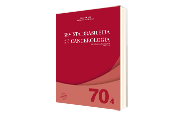Comparação entre os Critérios GLIM, o Consenso de Caquexia do Câncer e a ASG-PPP VR para o Diagnóstico Nutricional de Pacientes com Câncer Avançado em Cuidados Paliativos
DOI:
https://doi.org/10.32635/2176-9745.RBC.2024v70n4.4771Palavras-chave:
Avaliação Nutricional, Desnutrição/diagnóstico, Caquexia/diagnóstico, Neoplasia/dietoterapia, Cuidados PaliativosResumo
Introdução: O diagnóstico nutricional de pacientes com câncer pode variar de acordo com o método utilizado para avaliação. Objetivo: Avaliar a concordância dos critérios do Global Leadership Initiative on Malnutrition (GLIM) e do consenso de caquexia do câncer com avaliação subjetiva global produzida pelo paciente versão reduzida (ASG-PPP VR) para diagnóstico nutricional de pacientes com câncer avançado em cuidados paliativos. Método: Estudo observacional com pacientes com câncer avançado, avaliados no primeiro atendimento em unidade de cuidados paliativos. O estado nutricional foi definido por meio do critério GLIM, do consenso de caquexia e da ASG-PPP VR. Foram analisados os valores de concordância pelo coeficiente de Kappa (k) e calculadas as medidas de acurácia entre os métodos. Resultados: Foram incluídos 254 pacientes, com mediana de idade de 65 anos e predominância do sexo masculino (55,1%). A prevalência de alterações do estado nutricional foi de 71,3%, 79,1% e 58,3%, conforme o GLIM, consenso de caquexia e ASG-PPP VR, respectivamente. A concordância entre o GLIM e o consenso de caquexia foi moderada (k = 0,79; p < 0,001), enquanto com a ASG-PPP VR foi muito fraca (GLIM k = 0,06; p = 0,320 e consenso de caquexia k = 0,06; p = 0,224). A acurácia entre o GLIM e o consenso de caquexia foi alta (92,1%), contudo, demonstraram baixa acurácia (<57,9%) em relação à ASG-PPP VR. Conclusão: Comparados com ASG-PPP VR, os critérios do GLIM e do consenso de caquexia apresentaram concordância e acurácia consideradas não aceitáveis para o diagnóstico nutricional, o que sugere menor aplicabilidade prática para a avaliação nutricional dessa população.
Downloads
Referências
De Groot LM, Lee G, Ackerie A, et al. Malnutrition screening and assessment in the cancer care ambulatory setting: mortality predictability and validity of the Patient-Generated Subjective Global Assessment Short form (PG-SGA SF) and the GLIM criteria. Nutrients. 2020;12(8):2287. doi: https://doi.org/10.3390/nu12082287
Yin L, Cheng N, Chen P, et al. Association of malnutrition, as defined by the PG-SGA, ESPEN 2015, and GLIM criteria, with complications in esophageal cancer patients after esophagectomy. Front Nutr. 2021;8:632546. doi: https://doi.org/10.3389/fnut.2021.632546
Qin L, Tian Q, Zhu W, et al. The Validity of the GLIM criteria for malnutrition in hospitalized patients with gastric cancer. Nutr Cancer. 2021;73(11-12):2732-9. doi: https://doi.org/10.1080/01635581.2020.1856894
Henriksen C, Paur I, Pedersen A, et al. Agreement between GLIM and PG-SGA for diagnosis of malnutrition depends on the screening tool used in GLIM. Clin Nutr. 2022;41(2):329-36. doi: https://doi.org/10.1016/j. clnu.2021.12.024
Sealy MJ, Nijholt W, Stuiver MM, et al. Content validity across methods of malnutrition assessment in patients with cancer is limited. J Clin Epidemiol. 2016;76:125-36. doi: https://doi.org/10.1016/j.jclinepi.2016.02.020
Cederholm T, Jensen GL, Ballesteros-Pomar MD, et al. Guidance for assessment of the inflammation etiologic criterion for the GLIM diagnosis of malnutrition: a modified Delphi approach. Clin Nutr. 2023;43(5):1025-32. doi: https://doi.org/10.1016/j.clnu.2023.11.026 DOI: https://doi.org/10.1016/j.clnu.2023.11.026
Barazzoni R, Jensen GL, Correia MITD, et al. Guidance for assessment of the muscle mass phenotypic criterion for the Global Leadership Initiative on Malnutrition (GLIM) diagnosis of malnutrition. Clin Nutr. 2022;41(6):1425-33. doi: https://doi.org/10.1016/j.clnu.2022.02.001 DOI: https://doi.org/10.1016/j.clnu.2022.02.001
Gonzalez MC, Mehrnezhad A, Razaviarab N. Calf circumference: cutoff values from the NHANES 1999-2006. Am J Clin Nutr. 2021;113(6):1679-87. doi: https://doi.org/10.1093/ajcn/nqab029 DOI: https://doi.org/10.1093/ajcn/nqab029
SPSS®: Statistical Package for Social Science (SPSS)[Internet]. Versão 23.0. [Chicago]. International Business Machines Corporation. [acesso 2023 mar 9]. Disponível em: https://www.ibm.com/br-pt/spss?utm_content=SR CWW&p1=Search&p4=43700077515785492&p5= p&gclid=CjwKCAjwgZCoBhBnEiwAz35Rwiltb7s14 pOSLocnooMOQh9qAL59IHVc9WP4ixhNTVMjen Rp3-aEgxoCubsQAvD_BwE&gclsrc=aw.ds
McHugh ML. Interrater reliability: the kappa statistic. Biochem Med (Zagreb). 2012;22(3):276-82. DOI: https://doi.org/10.11613/BM.2012.031
de van der Schueren MAE, Keller H, GLIM Consortium, et al. Global Leadership Initiative on Malnutrition (GLIM): guidance on validation of the operational criteria for the diagnosis of protein-energy malnutrition in adults. Clin Nutr. 2020;39(9):2872-80. doi: https://doi.org/10.1016/j.clnu.2019.12.022 DOI: https://doi.org/10.1016/j.clnu.2019.12.022
Wiegert EVM, Oliveira LC, Calixto-Lima L, et al. New cancer cachexia staging system for use in clinical practice. Nutrition. 2021;90:111271. doi: https://10.1016/j.nut.2021.111271 DOI: https://doi.org/10.1016/j.nut.2021.111271
Souza Cunha M, Wiegert EVM, Calixto-Lima L, et al. Relationship of nutritional status and inflammation with survival in patients with advanced cancer in palliative care. Nutrition. 2018;51-52:98-103. doi: https://doi.org/10.1016/j.nut.2017.12.004 DOI: https://doi.org/10.1016/j.nut.2017.12.004
Cunha GDC, Rosa KSDC, Wiegert EVM, et al. Clinical relevance and prognostic value of inflammatory biomarkers: a prospective study in terminal cancer patients receiving palliative care. J Pain Symptom Manage. 2021;62(5):978-86. doi: https://doi.org/10.1016/j.jpainsymman.2021.04.009 DOI: https://doi.org/10.1016/j.jpainsymman.2021.04.009
Martin L, Muscaritoli M, Bourdel-Marchasson I, et al. Diagnostic criteria for cancer cachexia: reduced food intake and inflammation predict weight loss and survival in an international, multi-cohort analysis. J Cachexia Sarcopenia Muscle. 2021;12(5):1189-202. doi: https://doi.org/10.1002/jcsm.12756 DOI: https://doi.org/10.1002/jcsm.12756
De Groot LM, Lee G, Ackerie A, et al. Malnutrition screening and assessment in the cancer care ambulatory setting: mortality predictability and validity of the Patient-Generated Subjective Global Assessment Short form (PG-SGA SF) and the GLIM criteria. Nutrients. 2020;12(8):2287. doi: https://doi.org/10.3390/nu12082287 DOI: https://doi.org/10.3390/nu12082287
Yin L, Cheng N, Chen P, et al. Association of malnutrition, as defined by the PG-SGA, ESPEN 2015, and GLIM criteria, with complications in esophageal cancer patients after esophagectomy. Front Nutr. 2021;8:632546. doi: https://doi.org/10.3389/fnut.2021.632546 DOI: https://doi.org/10.3389/fnut.2021.632546
Qin L, Tian Q, Zhu W, et al. The Validity of the GLIM criteria for malnutrition in hospitalized patients with gastric cancer. Nutr Cancer. 2021;73(11-12):2732-9. doi: https://doi.org/10.1080/01635581.2020.1856894 DOI: https://doi.org/10.1080/01635581.2020.1856894
Henriksen C, Paur I, Pedersen A, et al. Agreement between GLIM and PG-SGA for diagnosis of malnutrition depends on the screening tool used in GLIM. Clin Nutr. 2022;41(2):329-36. doi: https://doi.org/10.1016/j.clnu.2021.12.024 DOI: https://doi.org/10.1016/j.clnu.2021.12.024
Sealy MJ, Nijholt W, Stuiver MM, et al. Content validity across methods of malnutrition assessment in patients with cancer is limited. J Clin Epidemiol. 2016;76:125-36. doi: https://doi.org/10.1016/j.jclinepi.2016.02.020 DOI: https://doi.org/10.1016/j.jclinepi.2016.02.020
Downloads
Publicado
Como Citar
Edição
Seção
Licença
Os direitos morais e intelectuais dos artigos pertencem aos respectivos autores, que concedem à RBC o direito de publicação.

Este trabalho está licenciado sob uma licença Creative Commons Attribution 4.0 International License.









